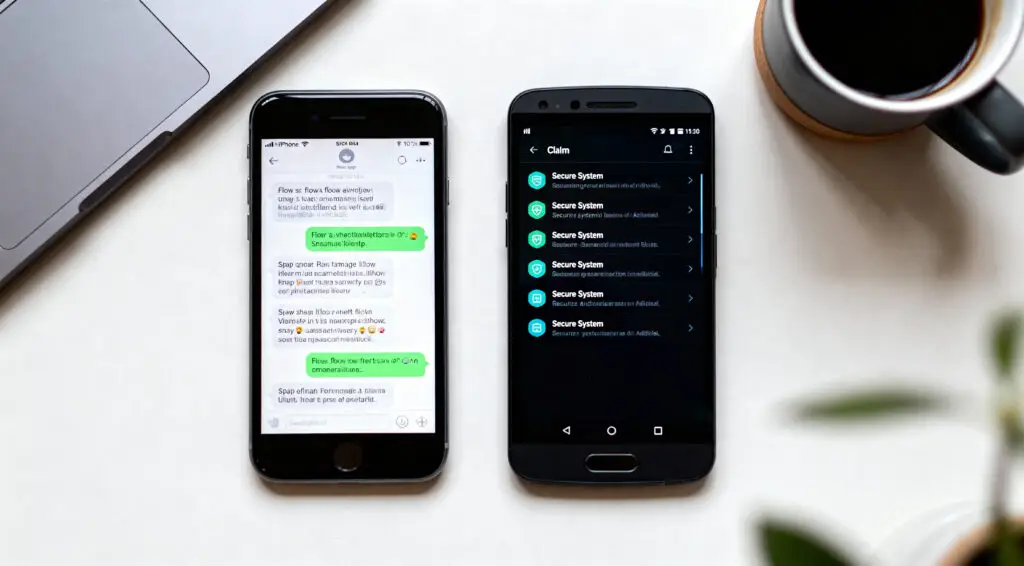New Study Exposes Major Scam Risks for iPhone Users
A recent analysis of the whole world found that iPhones are far more likely than Android smartphones to get spam and fake texts. Even though Apple’s iOS system is known for being very private, researchers found that it exposes users to more scam SMS.
If you thought that buying a high-end iPhone would automatically keep your personal information safe, the results say otherwise. The survey shows that people who possess iPhones get a lot more phishing and bogus message attempts than those who own Android phones.

Source: Buildfire
Android Devices Offer Better Scam Protection
Google and YouGov did the research by asking five thousand smartphone users in India and Brazil. The results indicated that those who used Android phones were 58% less likely to get scam or spam SMS than people who used iPhones.
Participants said that scammers target iPhone users more heavily, often sending them fake links that seem like real alerts. Android customers, on the other hand, had less effort to swindle them since their phones had better built-in filtering and AI-driven security.
Security Discrepancy Linked to System-Level Filtering Features
The study says that Android’s message filtering mechanisms are far better at finding and stopping fake messages. The statistics show that iPhone users may get up to 96% more spam messages than Android users in general.
This difference shows that Apple’s security approach, which is focused on privacy, doesn’t have the adaptive AI filtering that makes Android’s protections work. Experts think this discrepancy is why Android smartphones are better at fighting off new text-based frauds throughout the world.
Recommended Article: Samsung and NVIDIA Join Forces to Build Global AI Megafactory
Additional Research Confirms Pixel’s Industry-Leading Security
The Leviathan Security Group did a follow-up analysis that looked at how well numerous high-end cellphones introduced this year defend against fraud. The test comprised the Apple iPhone 17, the Google Pixel 10 Pro, the Motorola Razr+, and the Samsung Galaxy Z Fold 7.
The Pixel 10 Pro was the safest device since it included powerful scam-blocking tools that used Google’s AI engine. Researchers found that Pixel’s built-in safety makes people throughout the world much less likely to get phishing and scam messages.
Google Reports Billions of Scams Blocked Every Month
Google said that its AI algorithms stop more than 10 billion spam calls and emails per month throughout the world. These proactive detection algorithms are always becoming better at finding new scam trends and warning customers before they can do any harm.
This big AI defensive network makes Android more stable overall, which cuts down on financial losses and boosts user trust by a huge amount. Experts say that AI-powered interventions now stop an estimated 400 billion dollars in fraud losses per year throughout the world.
Apple Faces Pressure to Strengthen Anti-Fraud Capabilities
The report’s results have put Apple under fire for not keeping up with Android in terms of text-based fraud protection. Analysts want Apple to provide smarter, more flexible message-filtering tools that can find fraud trends in real time.
Critics say that Apple’s focus on privacy and encryption doesn’t make up for the fact that it doesn’t do a good job of detecting fraud before it happens. The business should soon look into ways to improve iMessage screening and AI safety technologies at the system level.
AI Becomes the Key Defense Against Modern Cyber Threats
Experts believe that artificial intelligence is currently the best way to protect smartphone users throughout the world from digital frauds. AI-powered security systems can see unusual activity, identify harmful trends, and stop threats before people can interact with them.
As digital fraud schemes get more complicated, adding AI protections is necessary to keep consumers secure. The success of the Google Pixel 10 shows how adaptive AI technology may change how mobile security works.
Android Strengthens Reputation as Security-Focused Platform
The findings together strengthen Android’s claim to be the best at preventing scams and fraud before they happen. Its focus on AI integration and regular upgrades keeps customers safe against attacker techniques that change quickly.
On the other hand, iPhone customers may be at greater danger until Apple adds similar real-time filtering features to its whole ecosystem. The results eventually remind all smartphone users that safety depends on more than just the brand’s reputation. It also depends on how well the technology can adapt.























